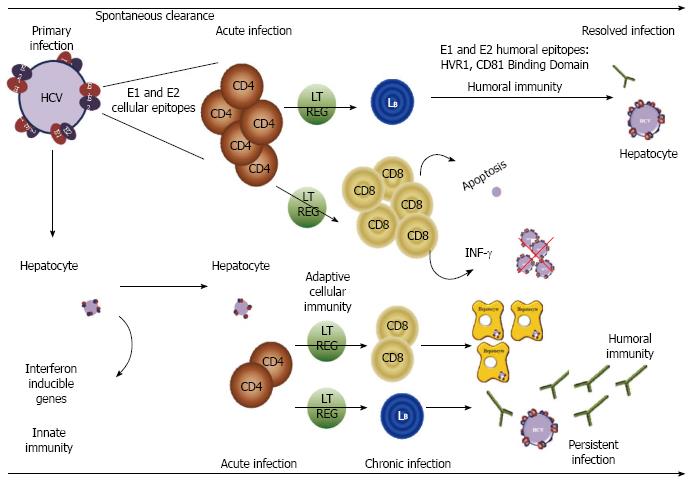Copyright
©2013 Baishideng Publishing Group Co.
World J Gastroenterol. Feb 7, 2013; 19(5): 654-664
Published online Feb 7, 2013. doi: 10.3748/wjg.v19.i5.654
Published online Feb 7, 2013. doi: 10.3748/wjg.v19.i5.654
Figure 3 Role of hepatitis C glycoproteins in the immune response to hepatitis C infection.
Following hepatitis C virus (HCV) infection, innate host response is initiated by hepatocytes producing an antiviral state by stimulating interferon inducible genes expression. In case of spontaneous clearance or resolved infection, a strong cellular response, due to CD4+ and CD8+ T lymphocytes (denoted as CD4 and CD8 in the figure), is observed in the early phase of infection. Moreover Regulatory T cells (Treg) cells (LT REG) limit the function of effector T cells. Then neutralizing antibodies are rapidly expressed. In most cases, the host adaptative immunity is unable to control HCV infection evolving to a chronic phase. The cellular response (CD4+ and CD8+ T lymphocytes and B lymphocytes, mentioned as LB in the figure) is weak and transient. The appearance of neutralizing antibodies is delayed and the humoral response not efficient. IFN: Interferon.
- Citation: Jeulin H, Velay A, Murray J, Schvoerer E. Clinical impact of hepatitis B and C virus envelope glycoproteins. World J Gastroenterol 2013; 19(5): 654-664
- URL: https://www.wjgnet.com/1007-9327/full/v19/i5/654.htm
- DOI: https://dx.doi.org/10.3748/wjg.v19.i5.654









